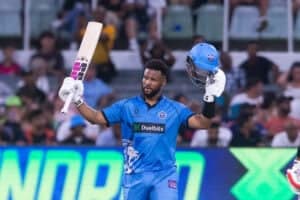SA needs to abandon grand ideas and put state capacity first, says political analyst Ralph Mathekga.

NASTASSIA ARENDSE: Joining us on the line is Ralph Mathekga, who is a political analyst, to take us through what’s been happening as we get closer and closer to the ANC conference. Ralph, thanks so much for your this evening.
RALPH MATHEKGA: Good evening. Thanks for inviting me and good evening to your listeners.
NASTASSIA ARENDSE: This journey started with the various candidates that have been named, and everybody who has been vying for this position. How would you characterise the road to the ANC conference?
RALPH MATHEKGA: Well, having observed some two past conferences of the ANC, this one seems to be a very tense one. We have seen big divisions within the party. For the first time in a very interesting manner we have even seen some of those factions within the party almost following ideological lines, or ideological lines were constructed along those factions. You do have within the ANC some differences in terms of policy – economic policy and so forth. I think I’ve never seen the party so divided.
Further, even the internal coherence of the party, the state of the branches, and so forth if you look at the distributive arrangement regarding the processes towards this conference, towards the build-up, the meetings that were held and elimination process, you do have quite a higher number of disputes than before. So the party is highly divided, I think.
NASTASSIA ARENDSE: I was just thinking about the comments earlier on, as the KZN conference is taking place right now. They’ve actually been urging delegates to sing unifying songs as opposed to singing the songs that you want to sing. Do you think that the ANC could come out united, because that’s been the word everyone has been using – that Gwede Mantashe has been using – that they want a united ANC?
RALPH MATHEKGA: The thing is that members of the ANC tend to think about unity as an event, something that you just arrive at and they do not think about it as a process. If you look at the ANC from as far back as the Polokwane conference in 2007, they have been divided and I’ve not seen quite a satisfactory effort to unite the party. Those who have usually lost since 2007 were cast out and those who said “I lost in the 2012 conference” were also cast out. You’ve seen the NEC there that came out of 2012 was quite perfectly aligned with the top leadership that emerged.
So this sense of unity that they talk about – even from the past in 2007 – does not point to any commitment to unity. We are not seeing any actual efforts being put on the ground to build unity. The party has been more and more incoherent. I understand their frustration when they call unity, when they say songs have to be songs of unity and so forth. That is just the face, it will just paper through the whole thing. There are much, much deeper divisions.
If they are really united the first effort they need to show is those who lose need to accept the result and those who win need to bring those who lose together and build the party, because the challenge of a party should be shared around all of them.
NASTASSIA ARENDSE: Speaking of challenges, irrespective of who becomes the [successful] candidate, whether it’s Cyril Ramaphosa or Nkosazana Dlamini-Zuma, what challenges lie ahead, not just in the party, but in fixing the economy and all the other problems we’ve been talking about – state capture, corruption, etc?
RALPH MATHEKGA: The first thing is the state capacity in South Africa. Sometimes my view is that we often like to talk about grand ideas as to whether we are going to go with radical economic transformation and so forth, and of course there is a need for clarity with regard to those ideas. But I think that we are still at the basic level. The basic level is when you need state capacity, the institutions to function, to eliminate of course fraud and corruption. If you have state capacity, if you make sure that, if you spend R40 million at a hospital and the better part of it going to actual delivery of services, you’ve improved that state capacity. You can just do the basics.
So my biggest concern when I look at South Africa is that we are not at the level of rating digital differences here, although we are led to amplify those. But I think our problems are still very basic. Strengthen the state capacity, make sure that law enforcement is really good, make sure that we have the basic business environment, just so that shops can open after six o’clock and not have a concern – restaurants, for example – about safety and security. Once you take care of that, then we can move on to grand ideas about our world views as to which direction the economy ought to go.
NASTASSIA ARENDSE: Alright, Ralph. Thanks so much for your time.
Brought to you by Moneyweb
For more news your way, follow The Citizen on Facebook and Twitter.






